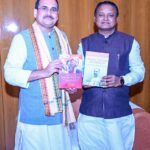Under Prime Minister Narendra Modi India Rises as a Responsible Power
- By : Anirban Ganguly
- Category : Articles

The Doklam episode and its successful culmination reflect the sagacity, the maturity, the foresight and fortitude of the leadership of Prime Minister Modi. The situation was handled in a manner that displayed a blend of determination, pragmatism, realism and the will to protect and pursue India’s national interest.
The direction of Prime Minister Modi’s leadership that sees India as a once-again rising civilisation and not a mere appendage to some other dominant power saw us through this episode. This has been Prime Minister Modi’s characteristic, his style, if one may so term it, of governance. His appeals for disseminating transformative public knowledge, his exhortation to exceed ourselves for the cause of India’s collective good, his appeals to give up and reject all that retards our national march towards becoming a great nation is always made with dynamic conviction and fervent energy.
Prime Minister Modi has never acceded to empty rhetoric, public posturing and has rather silently gone about his work while weaving and implementing a saving strategy. The Doklam episode, like a few others in the last three odd years, is another example of his manner of functioning. He does this, because of his core faith in the essential strength of the people and his conviction that makes him see them as partners in India’s growth and not elements who need to be satisfied with doses of jingoism and false assurances. We have to start getting used to such an approach; it contributes to the movement of refining our public life.
In the formation and re-consolidation of the terms of Indian exceptionalism, the method in which Prime Minister Modi has handled the Doklam issue shall remain a chapter to be cited and studied by historians of strategy and of civilisation. Over the last decade, an acute drishti-dosha (false self-perception) had afflicted our national psyche. When ruled by uncertain minds, hesitant leaders, confused policy makers and an unclear political centre, the growth of this false self-perception takes rapid root and debilitates our decision making powers and dilutes our abilities not only to assess the challenging situation but also to resist it. That drishti-dosha, has now to a great extent dissipated and continues to recede. The place that it yields is filling up with the sense of India’s civilisational status.
One of the characteristic attributes of Indian exceptionalism under Prime Minister Narendra Modi, is the sense of international responsibility that India has been demonstrating. The rise of a civilisational state has to be a responsible and not a disruptive rise. A civilisational power, inspired by the Eastern philosophical framework, has to display responsibility while trying to re-assume its place in the comity of nations.
For India however, such an approach is inherent in her Bharatiya tradition and is being displayed distinctly now. She rises responsibly, she radiates her acceptance of, as Prime Minister Modi observes, “ the rise of many powers”, she believes in an “inter-dependent” and “inter-connected world”, she visualises an Asian century which has the space, dimension and framework for the rise, co-existence and collective action of many powers of the region. Her approach to other powers is civilisational and backed by the will to protect, preserve and perpetuate her own global interests. The Doklam episode has demonstrated the strength of that approach.
















